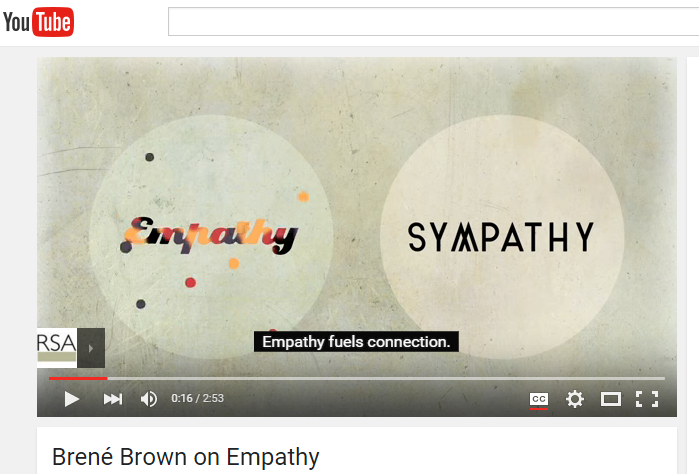Daughter Sarah put a link to a YouTube video in the comments yesterday. She said we should Skype about it and that would be fun. But in the meantime, I want to do a little thinking out loud here about it.
First, here’s the video.
So the message seems to me to be that empathy is desirable and that sympathy is unfeeling. As I said yesterday, I am entertaining rethinking my idea that empathy is problematic.
Before check the OED for some sentences and history on these words, I want to point out some problems with empathy. A quick google of René Brown reveals that she is a social worker with three degrees in the subject. Family system theory is small discipline in psychology. When I heard Friedman talk, it was obvious to me that is also not a widely accepted way of thinking.

Beyond Friedman, I have used ideas I gleaned from him to help me with my own behavior. Specifically in terms of my individuation, or understanding of where my personality ends and others begin. It is easy to miss this boundary. When other people do this to me, I identify this kind of behavior as globbing. People who seem not to be telling the difference between themselves and me attribute motivations and understandings to me that are more theirs than mine.

It is in this kind of context, that I think empathy can be dangerous. Brown’s ideas work with people who are clear to themselves and others about who they are. But often when dealing with troubled people, the trouble is chronic and it is easy to slip into behavior like advising, helping or in the case of the video reacting with unhelpful responses that begin with “at least” or reacting by trying “to make things better”

The video says that the way to make things better is “connection.” I think what makes things better is “presence.” What’s the difference and is there one?

Sometimes it’s tricky to try to connect without helping. I have found that knowing what to say to someone is less important than simply being present with them, sometimes not saying anything.

Also, in my mind is the idea of Rogerian listening skills. Carl Rogers entered my life via the “I hear you saying” movement that my parents bought into. It was annoying, but I think they had good intentions and were acting of love and trying to be good parents.
Later I was taught the technique by a psychologist in a weekend retreat arranged by the priest I was working for himself and his staff.

I learned that when someone is speaking to me and trying to sort through feelings and ideas and maybe even problem solve out loud, it can be helpful to them to feed their ideas back to them as unfettered by my own stuff as is possible and with honesty.
This seems like a kind of “presence” to me.
Finally for what it’s worth, the word “empathy” is a much younger word than the word “sympathy” in the English language.

I seem to recall that Friedman made this point. The OED shows the first recorded use of “empathy” this way:
1895 E. L. Hinman tr. K. Lasswitz in Philos. Rev. 4 673 For the capacity factor of psychophysical energy the name ‘empathy’ is proposed. Empathy is then a physical quantity, a physiological brain-function, and is defined as the relation of the whole energy at any change of the central organ to the intensity.
“Sympathy” this way:
1578 J. Lyly Euphues f. 9, Doth not the sympathy of manners, make the coniunction of mindes?
We probably need both words and concepts to be complete humans.

Just my opinion. Comments/corrections welcome here (or later on Skype, Sarah J.)

Presence. Yes. Thanks for these thoughts. They came just at the right moment for me.
She said cryptically. Sorry, I’ll tell you later. Hope to talk to you soon. Love you.
Serendipity, eh? Sorry I missed you and the fam the other night on Skype. I love you.